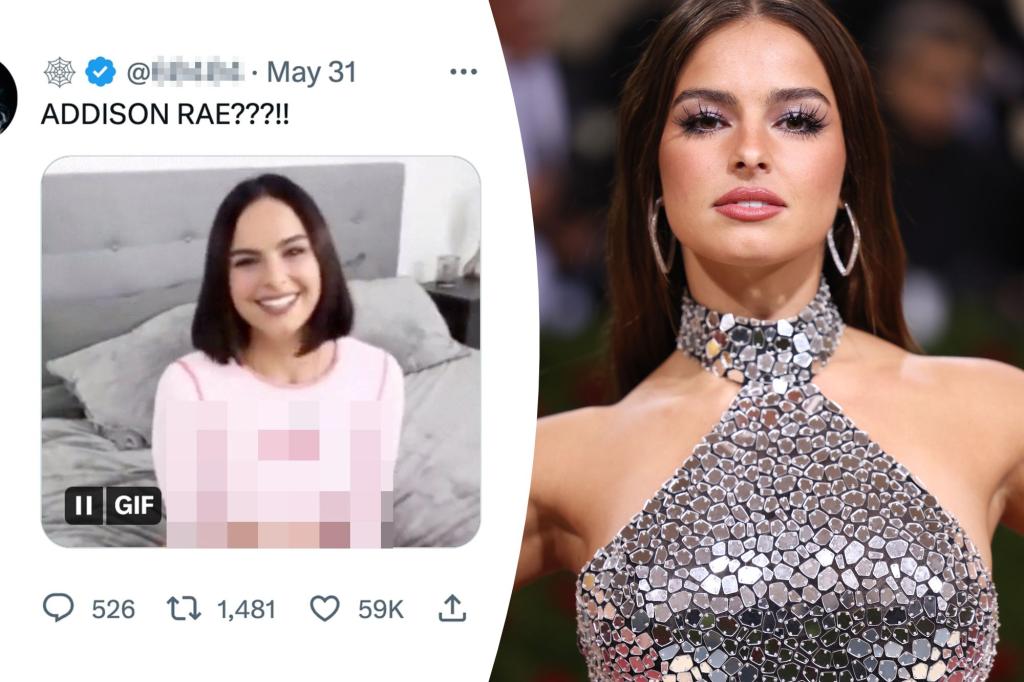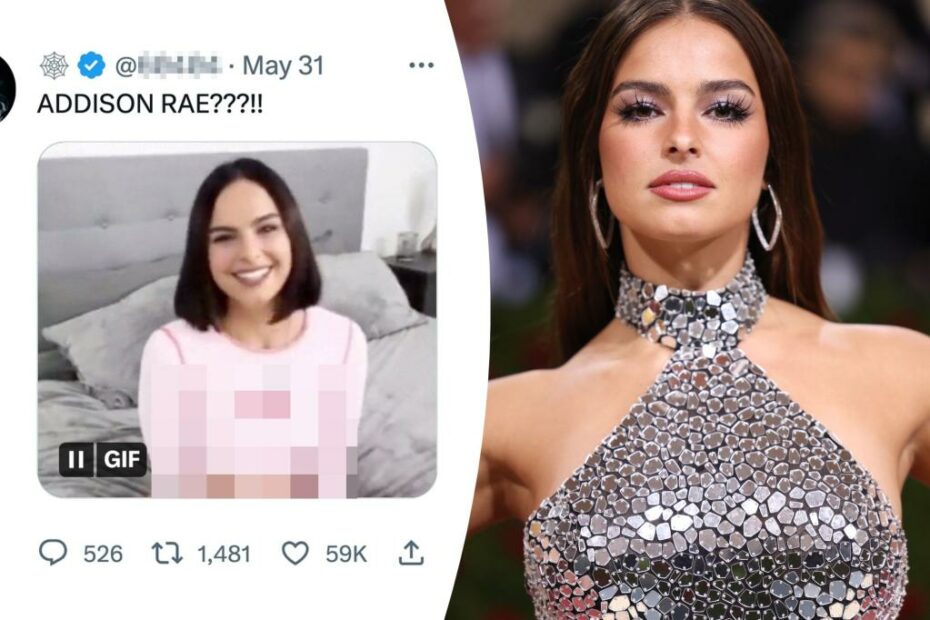Deepfake celebrity porn floods Twitter — despite explicit bans
Title: X-Rated Deepfakes of Celebrities Circulate Online, Raising Concerns Over Misleading Content and Non-Consensual Imagery
X-rated celebrity deepfakes have become increasingly prevalent online as advancements in artificial intelligence and technology blur the lines between real images and manipulated content. To Twitter’s dismay, sexually explicit deepfakes featuring popular TikTok creators and celebrities have surfaced on the platform, violating the company’s policies against misleading media and non-consensual nudity.
According to a recent report by NBC News, Twitter searches for TikTok creators Addison Rae Easterling, Charli D’Amelio, and Bella Poarch yielded results of explicit deepfakes. These deepfakes involve videos or images where an individual’s face is superimposed onto someone else’s body. In one disturbing clip, the face of 22-year-old Easterling was placed onto another woman’s body in a seductive manner. This particular video garnered over 21 million views, and the thread contained additional explicit content related to the deepfake. The anonymous individual behind the account confessed to deleting the tweet following blowback. Easterling, a popular TikTok creator, boasts one of the largest followings among women on the platform.
NBC also uncovered the circulation of an X-rated deepfake of Easterling on Twitter, and the outlet claims to have come across at least nine accounts that distribute pornographic deepfakes. Out of these, six accounts were subsequently suspended. Some of the deepfakes involved explicit content using Poarch’s likeness, while imagery of the D’Amelio family still remains on the platform. These types of content on Twitter appear to violate two of the company’s strict content policies: the synthetic and manipulated media policy, which prohibits misleading or fabricated content presented as factual, and the non-consensual nudity policy, which forbids the sharing of intimate media without consent.
Upon reaching out for comment, Twitter responded to The Post’s email with a poop emoji. Representatives for D’Amelio could not be reached, whereas The Post contacted the representatives of Poarch and Easterling for additional remarks. D’Amelio, another highly followed creator, has also been subjected to explicit fake content.
Regrettably, these TikTokers are not the only victims of pornographic deepfakes. Numerous women have been targeted with such content as well. Earlier this year, actresses Emma Roberts and Scarlett Johansson found themselves at the center of a sexually suggestive advertisement for deepfake software, which Facebook later removed. Additionally, a Texas teacher fell victim to digitally altered nude photos, and two Twitch streamers expressed their concerns over this emerging trend. “This is what it looks like to feel violated. This is what it feels like to be taken advantage of, this is what it looks like to see yourself naked against your will being spread all over the internet,” stated one of the streamers, 28-year-old Blaire, also known as QTCinderella.
Efforts are being made to combat digitally altered imagery through community guidelines and laws. In April, a man from Long Island was sentenced to six months in prison for posting explicit deepfake images of underage women on pornographic websites. Moreover, TikTok has implemented a ban on deepfakes that not only mislead audiences about significant events but also feature the appearances of private individuals and minors. However, deepfakes extend beyond explicit content. For instance, faux images of Pope Francis wearing Balenciaga clothing fooled millions of viewers. Additionally, in March, corners of the internet showcased deepfakes depicting former President Donald Trump’s alleged first arrest, prompting Google to take swift action and label the images as AI-generated.
FAQs:
1. What are deepfakes?
Deepfakes refer to manipulated videos or images created using artificial intelligence and advanced technology, where a person’s face is superimposed onto someone else’s body.
2. How are celebrities affected by deepfakes?
Celebrities, including popular TikTok creators, have become targets of deepfake pornography, with explicit content featuring their likeness circulating online.
3. Why is Twitter facing criticism for the presence of deepfakes on its platform?
Despite Twitter’s policies against misleading media and non-consensual nudity, sexually explicit deepfakes continue to be shared on the platform, violating the company’s content guidelines.
4. What actions have been taken to address the issue of deepfakes?
Authorities and social media platforms have implemented measures to tackle deepfakes, including sentencing individuals who post explicit deepfake images to prison. TikTok has outright banned deepfakes that deceive audiences or portray private individuals and young people.
5. How far-reaching are deepfakes beyond explicit content?
Deepfakes have been used for purposes other than explicit material, including creating misleading imagery of public figures and celebrities. This technology has the potential to deceive and mislead audiences.

Twitter flooded with deepfake celebrity porn, despite explicit bans
X-Rated Celebrity Deepfakes Flood Twitter Despite Policies Against Misleading Content and Non-Consensual Nudity
In the age of advanced technology and artificial intelligence, the proliferation of X-rated celebrity deepfakes is becoming increasingly rampant online. Twitter, despite its policies against misleading media and non-consensual nudity, has fallen victim to this disturbing trend, with digitally altered explicit imagery of popular TikTok creators and celebrities making its way onto the platform, as reported by NBC News.
A recent investigation by NBC News found sexually explicit deepfakes featuring TikTok creators Addison Rae Easterling, Charli D’Amelio, and Bella Poarch circulating on Twitter. Deepfakes refer to manipulated videos or images where a person’s face is superimposed onto someone else’s body, creating the illusion of real footage. One particular clip showcased Easterling’s face on another woman’s body, seductively posing on a bed. This explicit deepfake garnered over 21 million views before being deleted by the anonymous user responsible for the account, after facing backlash.
Easterling, a prominent female creator on TikTok, is not the only one to have fallen victim to this disturbing trend. According to NBC News, an X-rated deepfake of Easterling circulating on Twitter was just one example of many explicit deepfakes involving TikTok stars. NBC News reports that at least nine accounts were found to be actively spreading pornographic deepfakes, leading to the suspension of six of those accounts. Bella Poarch’s likeness was also reportedly exploited in explicit content found on the platform, while imagery involving the D’Amelio family remains present.
The explicit content found on Twitter violates two of the company’s stringent content policies. Firstly, the synthetic and manipulated media policy bans misleading or fabricated content that is presented as factual. Additionally, the content may also violate Twitter’s non-consensual nudity policy, which prohibits the sharing of intimate photos or videos without the consent of those involved.
When approached for comment, Twitter responded in a dismissive manner, using a poop emoji, highlighting the platform’s lack of seriousness toward addressing the issue. Representatives for D’Amelio, Poarch, and Easterling were either unreachable or declined to comment on the matter.
D’Amelio, Easterling, and Poarch are not the only female creators being targeted by X-rated deepfakes on TikTok. This disturbing trend has affected numerous women, including actresses such as Emma Roberts and Scarlett Johansson. Facebook recently removed a sexually suggestive advert for deepfake software featuring these actresses. Moreover, there have been instances of private individuals falling victim to digitally altered nude photos, leading to widespread concern. Twitch streamers have also lamented this emerging trend, describing the feeling of violation and helplessness that comes with having intimate and manipulated content spreading across the internet without consent.
While community guidelines and legal measures are starting to crack down on the issue of deepfake content, the problem persists. In April, a man from Long Island was sentenced to six months in prison for sharing lewd deepfake images of underage women on porn sites. TikTok has taken a strong stance against deepfakes, banning the use of deepfakes that not only mislead audiences regarding major events but also exploit the likenesses of private individuals and minors. However, deepfakes transcend the realm of explicit content, with faux images of Pope Francis wearing luxury fashion brand Balenciaga fooling millions of viewers. In a similar vein, deepfakes depicting former president Donald Trump’s supposed first arrest circulated on the internet, prompting Google to take swift action and label the images as AI-generated.
The issue of X-rated celebrity deepfakes on Twitter and other platforms demands comprehensive and focused coverage. As technology continues to advance, the potential for exploitation and the spread of misleading content through deepfakes intensifies. It is crucial to stay on topic and delve deep into the intricacies and implications of this evolving phenomenon.
